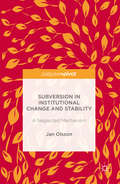- Table View
- List View
Suburban Remix: Creating the Next Generation of Urban Places
by David Dixon Jason BeskeThe suburban dream of a single-family house with a white picket fence no longer describes how most North Americans want to live. The dynamics that powered sprawl have all but disappeared. Instead, new forces are transforming real estate markets, reinforced by new ideas of what constitutes healthy and environmentally responsible living. Investment has flooded back to cities because dense, walkable, mixed-use urban environments offer choices that support diverse dreams. Auto-oriented, single-use suburbs have a hard time competing.Suburban Remix brings together experts in planning, urban design, real estate development, and urban policy to demonstrate how suburbs can use growing demand for urban living to renew their appeal as places to live, work, play, and invest. The case studies and analyses show how compact new urban places are already being created in suburbs to produce health, economic, and environmental benefits, and contribute to solving a growing equity crisis.Above all, Suburban Remix shows that suburbs can evolve and thrive by investing in the methods and approaches used successfully in cities. Whether next-generation suburbs grow from historic village centers (Dublin, Ohio) or emerge de novo in communities with no historic center (Tysons, Virginia), the stage is set for a new chapter of development—suburbs whose proudest feature is not a new mall but a more human-scale feel and form.
Suburban Socialism: (Or Barbarism)
by Oly DuroseReflecting on his own landslide loss in conservative suburbia, Oly Durose asks how we can transform the urban outskirts of the status quo into centres of transformative change.In December 2019, Oly Durose lost by over 25,000 votes as the Labour Party Parliamentary Candidate for Brentwood & Ongar. Revealing what it&’s like to stand on a socialist platform in one of the safest Conservative seats in the UK, this book makes the case for socialism in the suburbs, unveils the challenges of its electoral realisation, and proposes a strategic revolution required to win.Suburban Socialism asks what it would be like to bring white picket fences under collective control instead. To convince suburbanites of this radical alternative inside the electoral arena, this book argues that we must revolutionise our strategy outside of it. From the aftermath of the Industrial Revolution to the shockwaves of the metropolitan youthquake, socialism has predominantly been framed as an urban struggle. Identifying the possibilities for suburban resistance, this book offers a more geographically inclusive invitation to the socialist struggle, revealing why the suburban struggle is global in scale. Turning a suburb that shares from a hopeless fantasy into an electoral reality, Suburban Socialism illustrates why the path to socialism around the world is through the heterogenous suburban terrain.
Suburban Sprawl: Private Decisions and Public Policy (Cities And Contemporary Society Ser.)
by Wim Wiewel Joseph J. PerskySuburban Sprawl combines historical, political, economic, geographic, and urban planning analysis to provide the most comprehensive overview of why and how urban sprawl occurs. It shows that all previous attempts to pin the blame on one or two causes - "highway building" or "consumer preferences" - totally miss the complex and interwoven character of public policy and private interests in creating today's urban form. The authors have included the detailed analyses of expenditures which show that federal housing subsidies have contributed significantly to sprawl in the post-war period, as well as a comprehensive overview of policies that can be used to reduce sprawl or reduce its negative consequences. This book will inform the growing policy community involved in regionalism and the general urban policy community. It can also be assigned in undergraduate and graduate level classes in urban sociology, geography, urban politics, and urban planning.
Suburban Sweatshops: The Fight for Immigrant Rights
by Jennifer GordonJorge Bonilla is hospitalized with pneumonia from sleeping at the restaurant where he works, unable to afford rent on wages of thirty cents an hour. Domestic worker Yanira Juarez discovers she has labored for six months with no wages at all; her employer lied about establishing a savings account for her. We live in an era of the sweatshop reborn. In 1992 Jennifer Gordon founded the Workplace Project to help immigrant workers in the underground suburban economy of Long Island, New York. In a story of gritty determination and surprising hope, she weaves together Latino immigrant life and legal activism to tell the unexpected tale of how the most vulnerable workers in society came together to demand fair wages, safe working conditions, and respect from employers. Immigrant workers--many undocumented--won a series of remarkable victories, including a raise of thirty percent for day laborers and a domestic workers' bill of rights. In the process, they transformed themselves into effective political participants. Gordon neither ignores the obstacles faced by such grassroots organizations nor underestimates their very real potential for fundamental change. This revelatory work challenges widely held beliefs about the powerlessness of immigrant workers, what a union should be, and what constitutes effective lawyering. It opens up exciting new possibilities for labor organizing, community building, participatory democracy, legal strategies, and social justice.
Suburban Warriors: The Origins of the New American Right - Updated Edition (Politics and Society in Modern America)
by Lisa McGirrIn the early 1960s, American conservatives seemed to have fallen on hard times. McCarthyism was on the run, and movements on the political left were grabbing headlines. The media lampooned John Birchers's accusations that Dwight Eisenhower was a communist puppet. Mainstream America snickered at warnings by California Congressman James B. Utt that "barefooted Africans" were training in Georgia to help the United Nations take over the country. Yet, in Utt's home district of Orange County, thousands of middle-class suburbanites proceeded to organize a powerful conservative movement that would land Ronald Reagan in the White House and redefine the spectrum of acceptable politics into the next century. Suburban Warriors introduces us to these people: women hosting coffee klatches for Barry Goldwater in their tract houses; members of anticommunist reading groups organizing against sex education; pro-life Democrats gradually drawn into conservative circles; and new arrivals finding work in defense companies and a sense of community in Orange County's mushrooming evangelical churches. We learn what motivated them and how they interpreted their political activity. Lisa McGirr shows that their movement was not one of marginal people suffering from status anxiety, but rather one formed by successful entrepreneurial types with modern lifestyles and bright futures. She describes how these suburban pioneers created new political and social philosophies anchored in a fusion of Christian fundamentalism, xenophobic nationalism, and western libertarianism. While introducing these rank-and-file activists, McGirr chronicles Orange County's rise from "nut country" to political vanguard. Through this history, she traces the evolution of the New Right from a virulent anticommunist, anti-establishment fringe to a broad national movement nourished by evangelical Protestantism. Her original contribution to the social history of politics broadens—and often upsets—our understanding of the deep and tenacious roots of popular conservatism in America.
Suburbia Reimagined: Ageing and Increasing Populations in the Low-Rise City
by Nigel Bertram Leon van SchaikWorldwide, more and more people are living in cities, with suburbs conceived as appendages to the city, rather than being part of the city system, which is densely populated and offers a full range of services. But suburbs are not the city spread too thin, and in fact hold potential for a lived complexity as satisfying as that assumed to be available in inner cities. Just as the ecological function of wetlands was ignored by modernist planning, and swamps once-drained are now recognised as vital to water cycles, suburbs are increasingly recognised as part of a city’s wellbeing with their own alternative ideology and opportunities for urbanity and ecological sustainability. Suburbia Reimagined shows how such subdivision structures can offer new possibilities for sustainably integrating living between generations and between established and arriving migrant communities. The authors worked locally and internationally with university campuses, shopping centres, hospitals, airports, and other large entities spread through suburbia, to identify a broad range of suburban situations that have been modified to ensure that residents have a full access to amenities and services. The book addresses the history and design of suburbia, from the post-war soldier settlements of the 40s and 50s to the university hinterlands of Silicon Valley in order to reappraise the locked potential within such subdivision patterns. The authors propose a new model forward, examining case studies ranging from repurposed malls and railways for ecological sustainability to cul-de-sacs as social units and post-industrial factory conversions, ultimately showing the nascent patterns in suburbia that have the potential to support a rich life for all age groups.
Suburra
by Carlo Bonini Giancarlo de CataldoThe “razor-sharp political thriller set during the dying days of Berlusconi’s regime” that inspired the Netflix original series (New Statesman).This “fast-moving crime thriller” takes a deep dive into a politically and financially corrupt contemporary Italy, where crime families, corrupt politicians, and new rabid criminal elements battle each other for control of a glittering prize—a multibillion-dollar development twenty miles from the Italian capital (Publishers Weekly).During the final days of Silvio Berlusconi’s reign, a massive development proposal that will turn the depressed coastal settlement of Ostia into a gambling paradise, a Las Vegas on the Mediterranean, is winding its way through the Italian legislature thanks to the sponsorship of politicians in the pay of crime syndicates. It’s business as usual in the Italian capital. Or so it seems. A vicious gang of local thugs loyal to nobody but themselves is insisting on a bigger cut than agreed upon. The Mafia and their political puppets aren’t going to back down without a fight. And one policeman, pushed to the sidelines, may not be able to stop an all-out war . . .With a plot that “thrills from the get-go,” Suburra is a compelling work of international crime fiction and the inspiration for the popular Netflix series of the same name (New Statesman).“A novel of Rome, meaning that the city itself, in all its history, glory, and despair, is skillfully sewn into the fiber of the tale. . . . Evokes Mario Puzo’s famous trilogy and other classics of the genre.” —Kirkus Reviews
Subversion and Insurgency
by William RosenauSubversion is a critical insurgent tool, but it has long been ignored by policymakers and analysts. This paper presents a set of case studies to explore the elements of subversion and discusses preliminary ideas for combating subversive activities in the context of the "long war" against violent Islamic extremism.
Subversion in Institutional Change and Stability
by Jan OlssonThis book theorizes subversive action, a neglected mechanism in the new institutionalism literature. Subversive action is political in nature, secretly undermining some institutions to open up alternative ideas or to secure existing institutions by secretly undermining adversaries. An example is a politician who promises change in public, but does something else behind the scenes to preserve the status quo. The book addresses the nature and meaning of subversive action and the contexts that give rise to it, as well as how it can work as an important mechanism behind institutional change and continuity. The book will interest students and scholars of public policy, public administration and political science.
Subversive Institutions: The Design and Destruction of Socialism and The State (Cambridge Studies In Comparative Politics Ser.)
by Valerie BunceBased on a series of controlled comparisons among regimes and states, Valerie Bunce's book argues that two factors account for the remarkable collapse of the socialist dictatorships in Europe from 1989-1992: the institutional design of socialism as a regime, a state and a bloc, and the rapid expansion during the 1980s of opportunities for domestic and international change. Together, these two factors explain not just why socialist regimes and states ended, but also why the process was peaceful in some cases and violent in others.
Subversive Itinerary
by Peter Kulchyski Shannon BellSubversive Itinerary investigates the theoretical evolution of the influential political theorist Gad Horowitz, as well as the historical impact of his ideas on Canadian life and letters. Bringing together dynamic new works by both established and emerging scholars, along with three new articles by Horowitz himself, this volume examines the concepts he developed and extends his approach beyond the current historical moment.The book includes a history of Horowitz's engagements as a public intellectual through appraisals of his early, mid, and late-career contributions, from the sixties to the present day. Along the way, the contributors present innovative new work in Canadian political thought, continental theory, Jewish philosophy, Buddhism, and radical general semantics. Subversive Itinerary demonstrates how Horowitz's itinerary delivers invaluable tools for understanding issues of critical importance today.
Subversive Pedagogies: Radical Possibility in the Academy (Interventions)
by Kate SchickThis interdisciplinary volume examines the place of critical and creative pedagogies in the academy and beyond, offering insights from leading and emerging international theorists and scholar-activists on innovative theoretical and practical interventions for the classroom, the university, and the public sphere. Subversive Pedagogies draws attention to creative and critical pedagogies as a resource for engaging pressing problems in global politics. The collection explores the radical potential of pedagogy to transform students, scholars, citizens, and institutions. It brings together scholars and students from a range of disciplinary backgrounds, including international relations, political science, indigenous studies, feminist theory, and theatre studies, as well as practitioners in theatre and the arts. These diverse voices explore innovative pedagogical practices that extend our understanding of where pedagogy happens, invite critical assessment of the ways the neoliberal university shapes and restricts pedagogical engagement, and offer both theoretical and practical tools to explore more creative and broader understandings of what pedagogy can and should do. The book will appeal to scholars and students from a range of disciplinary backgrounds, including international relations, political science, indigenous studies, feminist theory, theatre studies, and education theory, as well as practitioners in theatre and the arts.
Subversives: The FBI's War on Student Radicals, and Reagan's Rise to Power
by Seth RosenfeldSubversives traces the FBI's secret involvement with three iconic figures at Berkeley during the 1960s: the ambitious neophyte politician Ronald Reagan, the fierce but fragile radical Mario Savio, and the liberal university president Clark Kerr. Through these converging narratives, the award-winning investigative reporter Seth Rosenfeld tells a dramatic and disturbing story of FBI surveillance, illegal break-ins, infiltration, planted news stories, poison-pen letters, and secret detention lists. He reveals how the FBI's covert operations—led by Reagan's friend J. Edgar Hoover—helped ignite an era of protest, undermine the Democrats, and benefit Reagan personally and politically. At the same time, he vividly evokes the life of Berkeley in the early sixties—and shows how the university community, a site of the forward-looking idealism of the period, became a battleground in an epic struggle between the government and free citizens. The FBI spent more than $1 million trying to block the release of the secret files on which Subversives is based, but Rosenfeld compelled the bureau to release more than 250,000 pages, providing an extraordinary view of what the government was up to during a turning point in our nation's history. Part history, part biography, and part police procedural, Subversives reads like a true-crime mystery as it provides a fresh look at the legacy of the sixties, sheds new light on one of America's most popular presidents, and tells a cautionary tale about the dangers of secrecy and unchecked power.
Subverting Empire
by Will Jackson Emily J. ManktelowThe British Empire was never as orderly as its architects would have us believe. Across the British imperial world, rules were broken, norms and social conventions were ignored and boundaries were transgressed. This is the first historical study to probe the colonial history of deviance, bringing to light stories of subversive behaviour that were deliberately covered up. With case studies ranging from Britain to New Zealand, India to East and Southern Africa, the book reveals what deviancein a colonial context actually entailed, as well as the ways in which deviants themselves were categorised, controlled and concealed. Ranging from murder to madness, forgery to fornication, Subverting Empire shows up the diverse ways in which governments attempted to enforce social order – and the ingeniousness of those who undermined it.
Subverting Mainstream Narratives in the Reagan Era: Giving Power To The People
by Ashley M. DonnellySubverting Mainstream Narratives in the Reagan Era explores how artists, novelists, and directors were able to present narratives of strong dissent in popular culture during the Reagan Era. Using but subverting the tools of mainstream novels and films, these visionaries’ works were featured alongside other books in major bookstores and promoted alongside blockbusters in movie theatres across the country. Ashley M. Donnelly discusses how the artists accomplished this, why it is so important, and how new artists can use these techniques in today’s homogenous and mundane media.
Subverting Resistance to Social Justice and Diversity Education: Constructive Approaches with Undergraduate Students (SpringerBriefs in Social Work)
by Andy J. Johnson April VindingThis compact book is constructed using psychological theory and research to empower university faculty to facilitate student engagement and address student resistance to diversity and social justice education more effectively. University faculty teaching diversity and social justice have traditionally encountered various forms of student resistance. Recent cultural trends of political opposition to teaching critical race theory and other forms of increased polarization and scapegoating with decreased levels of social tolerance have exacerbated challenges in promoting student engagement in diversity and social justice education in universities and colleges. In contrast to traditional models that tend to be confrontational in addressing student biases, the new Moving Towards Social Justice (MTSJ), Relational Partnership Development Model (RPDM) and process theoretical models seek to build on appropriate pre-existing strengths, interests, values, and the developmental readiness of students who might otherwise oppose learning about the contexts, lives, and predicaments of marginalized persons living in various intersections of gender, race, ethnicity, national origin, immigration status, sexual orientation, gender identity and ability/disability status. Emphasis is placed on the development of professional and life skills, such as wisdom and intercultural competence, which provide incentives and remove barriers to learning about social justice and diversity. Project-based learning approaches grounded in a developmental framework to foster the thriving and well-being of diverse students, collaborative partners in the community, and diverse persons served by the community partners are emphasized. The role of empirical assessment, feedback, and program refinement over time is also delineated within the models.Subverting Resistance to Social Justice and Diversity Education: Constructive Approaches with Undergraduate Students is an indispensable and timely resource for university and college instructors who teach courses or have significant portions of a class that involve education around social justice, diversity, and intersectionality issues, such as cross-cultural psychology, multicultural psychology, social work, sociology, intercultural communication, and counseling or clinical practice with individuals or families from diverse social locations. University officers of diversity, faculty development providers, and other administrators interested in empowering university faculty to increase student engagement in social justice and diversity education also would find the book a useful reference.
Subverting the Leviathan: Reading Thomas Hobbes as a Radical Democrat
by James MartelIn Leviathan, Thomas Hobbes's landmark work on political philosophy, James Martel argues that although Hobbes pays lip service to the superior interpretive authority of the sovereign, he consistently subverts this authority throughout the book by returning it to the reader. Martel demonstrates that Hobbes's radical method of reading not only undermines his own authority in the text, but, by extension, the authority of the sovereign as well. To make his point, Martel looks closely at Hobbes's understanding of religious and rhetorical representation. In Leviathan, idolatry is not just a matter of worshipping images but also a consequence of bad reading. Hobbes speaks of the "error of separated essences," in which a sign takes precedence over the idea or object it represents, and warns that when the sign is given such agency, it becomes a disembodied fantasy leading to a "kingdom of darkness." To combat such idolatry, Hobbes offers a method of reading in which one resists the rhetorical manipulation of figures and tropes and recognizes the codes and structures of language for what they are-the only way to convey a fundamental inability to ever know "the thing itself." Making the leap to politics, Martel suggests that following Hobbes's argument, the sovereign can also be seen as idolatrous-a separated essence-a figure who supplants the people it purportedly represents, and that learning to be better readers enables us to challenge, if not defeat, the authority of the sovereign.
Succeeding Together?: Schools, Child Welfare, and Uncertain Public Responsibility for Abused or Neglected Children
by Kelly Gallagher-MackayGrowing attention has focused on the education of children in the child welfare system, particularly those in foster care, but ninety-two percent of children in the child welfare system stay with their parents and their educational needs receive little attention. Succeeding Together? is an institutional ethnography that analyses front-line accounts from mothers, teachers, and child welfare workers to explore the educational issues facing abused and neglected children outside of foster care. Kelly Gallagher-Mackay examines the complex policy framework and underlying assumptions that shape the practice of collective responsibility for this vulnerable group, shining a light on the implications of their status in-between private and public responsibility. Gallagher-Mackay breaks down collective responsibility into three areas: surveillance and the duty to report, child welfare’s poorly defined responsibility to provide educational supports, and the privatized nature of teachers’ professional responsibility for caring. The involvement of child welfare represents a public judgment that there should be strong, proactive, and coordinated intervention to ensure protection and well-being. Succeeding Together? reveals significant shortfalls in coordination and commitment to the well-being of society’s most vulnerable.
Success and Failure in Limited War: Information & Strategy in the Korean, Vietnam, Persian Gulf & Iraq Wars
by Spencer D. BakichCommon and destructive, limited wars are significant international events that pose a number of challenges to the states involved beyond simple victory or defeat. Chief among these challenges is the risk of escalation—be it in the scale, scope, cost, or duration of the conflict. In this book, Spencer D. Bakich investigates a crucial and heretofore ignored factor in determining the nature and direction of limited war: information institutions. Traditional assessments of wartime strategy focus on the relationship between the military and civilians, but Bakich argues that we must take into account the information flow patterns among top policy makers and all national security organizations. By examining the fate of American military and diplomatic strategy in four limited wars, Bakich demonstrates how not only the availability and quality of information, but also the ways in which information is gathered, managed, analyzed, and used, shape a state’s ability to wield power effectively in dynamic and complex international systems. Utilizing a range of primary and secondary source materials, Success and Failure in Limited War makes a timely case for the power of information in war, with crucial implications for international relations theory and statecraft.
Success in Evaluation: Focusing on the Positives (Comparative Policy Evaluation Ser.)
by Rudi TurksemaSuccess in Evaluation takes a fundamentally different approach to the mainstream supply side discussion of evaluation quality, utilization, and learning. The contributors believe that a systematic focus on success will lead to increased awareness of evaluation and its findings, a more positive attitude, and a greater chance of actual evaluation use. This book offers many different lessons on how to improve evaluation design, research processes, and reporting. It is a realistic look at performance management, the evidence movement, and the demand barriers that so often block the role evaluators can play in organizational learning and decision-making. International case studies and lessons are included that both explain success-oriented methods and share insightful lessons from the real world. Together, they present a convincing case that evaluation for success allows for increased constructive interaction amongst both stakeholders and evaluators and, as a result, learning processes and outcomes will improve.
Success in Graduate School and Beyond: A Guide for STEM Students and Postdoctoral Fellows
by Nana Lee Reinhart ReithmeierSuccess in Graduate School and Beyond is designed to empower graduate students and postdoctoral fellows in STEM with practical tools, tips, and skill development strategies to plan and create their dream career pathway. Intended as a professional development course book, this balanced, self-reflective guide to workplace readiness is organized into five sections that support graduate student development: self-reflection, wellness, skills, networking, and planning for future success. Written in a conversational style, this guidebook includes clear learning outcomes based on the authors’ successful graduate professional development course at the University of Toronto. Covering increasingly important career subjects such as mentorships, transferrable skill development, emotional intelligence, and EDI, this guidebook solves a skills gap and builds core competencies demanded from industries and academia. Interspersed personal accounts from the authors about key topics and seven Alumni Career Profiles describing various career trajectories work to encourage self-awareness and promote essential skill development and networking proficiency. With this book, STEM students will be equipped with the abilities and tools to achieve success in graduate school and beyond.
Success in Social Marketing: 100 Case Studies From Around the Globe
by Philip Kotler Nancy R. LeeSocial marketing, a field first introduced by Philip Kotler and Gerald Zaltman in a pioneering article in the Journal of Marketing in 1971, uses marketing concepts to influence the behaviors of individuals and communities for the greater social good. Now, as the discipline celebrates its 50th anniversary, Success in Social Marketing provides an accessible and comprehensive guide to the field, introducing stories from around the world including public health, injury prevention, environmental protection, community engagement, financial well-being, and education. The 100 case examples contained in this book, each about two pages in length, follow an outline that includes key components of a campaign: Wicked Problem, Purpose & Focus, Priority Audience, Desired Behavior, Audience Insights, Marketing Intervention Mix, and Results. This common structure provides the reader with a clear sense of how success in social marketing may best be achieved in a wide variety of disciplinary and national contexts. Success in Social Marketing is intended to fill a gap in the market as well as inform and inspire students and practitioners through 100 easily digestible case studies. Issues addressed include public health (opioid use, mental health, COVID-19) , injury prevention (gun violence, youth suicide, texting while driving), environmental protection (wildfires, bicycle transportation in urban areas, food waste), community engagement (homelessness, racially motivated violence, voting) financial wellbeing (microfinance, savings, employment), and educational achievement (early childhood education, college applications, female participation in STEM programs), to name but a few. This book is required reading for students enrolled in public administration, public health, environmental studies, as well as policymakers interested in ways social marketing may help influence their constituent behaviors for individual, as well as social, good.
Successful Adaptation to Climate Change: Linking Science and Policy in a Rapidly Changing World
by Maxwell T. Boykoff Susanne C. MoserWhat does successful adaptation look like? This is a question we are frequently asked by planners, policy makers and other professionals charged with the task of developing and implementing adaptation strategies. While adaptation is increasingly recognized as an important climate risk management strategy, and on-the-ground adaptation planning activity is becoming more common-place, there is no clear guidance as to what success would look like, what to aim for and how to judge progress. This edited volume makes significant progress toward unpacking the question of successful adaptation, offering both scientifically informed and practice-relevant answers from various sectors and regions of the world. It brings together 18 chapters from leading experts within the field to present careful analyses of different cases and situations, questioning throughout commonly avowed truisms and unspoken assumptions that have pervaded climate adaptation science and practice to date. This book offers not one answer but demonstrates how the question of success in important ways is normative and context specific. It identifies the various dimensions of success, such as economic, political, institutional, ecological, and social, explores the tensions between them, and compiles encouraging evidence that resolutions can be found. The book appraises how climatic and non-climatic stressors play a role, what role science does and can play in adaptation decision making, and how trade-offs and other concerns and priorities shape adaptation planning and implementation on the ground. This is timely interdisciplinary text sheds light on key issues that arise in on-the-ground adaptation to climate change. It bridges the gap between science and practical application of successful adaptation strategies and will be of interest to both students, academics and practitioners.
Successful Group Care: Explorations in the Powerful Environment
by Martin WolinsEdited by one of the leading authorities in international child care, this sourcebook provides valuable insights from international experiments in group child care. The selections, written by distinguished international child care experts, explore a broad range of successful group care settings in Austria, Great Britain, Israel, Mexico, Poland, the Soviet Union, the United States and Yugoslavia. Much of the material was previously unknown to American professionals, at the time of the original publication, who, for the most part, held group care in disrepute. Today, there is a growing interest in group programs for children of various ages and in settings ranging from day care programs to institutions and schools of various types.Successful Group Care is divided into six major parts. The first of which is a general review of successful group care, drawing upon material that appears later in the book. Subsequent sections present historical and philosophical issues in group care, including boarding schools in the former Soviet Union and the Israeli Kibbutz. Research studies analyzing the negative and positive effects of group care for young children and several teenage group environments are discussed, particularly with regard to their peer effect on values and moral character. The project also deals with group care of disturbed children. The book ends with the most complete bibliography on the subject, including some of the most significant works in Polish, Russian, German, and Hebrew.This book will be invaluable to all those interested in and involved in group child care: social workers, particularly in child welfare; developmental child psychologists; early childhood educators; child psychiatrists; family sociologists; child care workers; day care personnel; and students in social work courses in childhood and adolescence, early childhood education, developmental psychology, and in training courses for day care personnel and child care work
Successful Public Health Advocacy: Lessons Learned from Massachusetts Legislators (SpringerBriefs in Public Health)
by Chris ChanyasulkitThis concise volume guides public health advocates on how to successfully advocate for their cause, strengthen their messaging and communication strategies, build coalitions, and gather political allies.In the book, the author shares lessons learned from an exploratory study in which key legislators from the Massachusetts General Court (legislature) were interviewed to determine their level of awareness and knowledge regarding health disparities. Racial and ethnic disparities in health are a major concern for citizens, states, and the nation and are important to study and understand to strategically address and eliminate such inequities. Through these lessons, public health advocates gain an understanding of whether and how factors affect knowledge and awareness of health disparities and learn to communicate more effectively with legislators, key stakeholders, and other decision-makers. The brief also features “Notes from the Field" from those working in the "trenches" that highlight different perspectives on health disparities and provide first-hand advice for advocates hoping to close the disparities gaps and create a more equitable nation for all. Successful Public Health Advocacy is a relevant resource for advocates, as well as students, in public health, public policy, and related fields who wish to gain a better understanding on how legislators gather their health information for policy-making or constituent work and apply this data to develop and implement effective public health advocacy campaigns.























